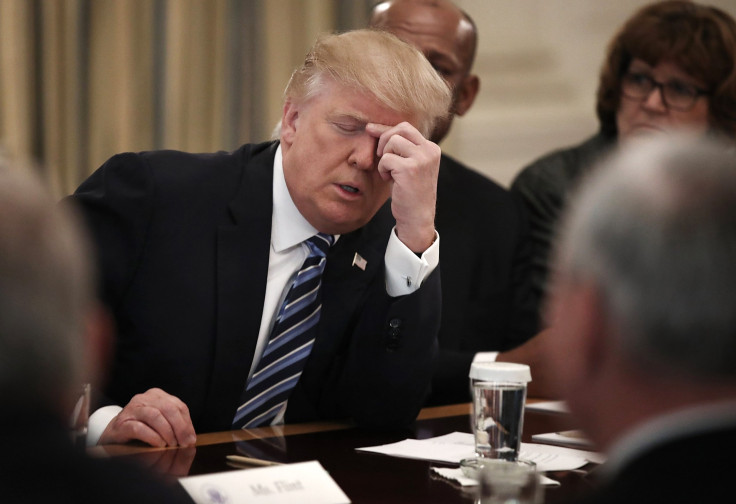Americans Flock To Therapists Amid 'President Trump Stress Disorder'

Since President Donald Trump was elected, some Americans have suffered from political anxiety. Doctors have since developed a name for it: the "President Trump Stress Disorder."
Trump’s rhetoric has seemingly galvanized Americans, stirring protests and rallies from groups like Black Lives Matter and the Ku Klux Klan. Trump ostensibly doubled down on his initial refute of hate groups like neo-Nazis Monday when he took to the podium the following day and blamed Charlottesville's incident on both protesters and anti-protestors. He referred to the counter-protesters as "bad" and "very violent."
More than half of American adults (57 percent) cited the current political climate as a primary source of stress, while almost half (49 percent) said the same regarding the election results, according to an American Psychological Association (ACA) poll released in January.
The APA reported that stress in American adults dipped over the past ten years. However, stress levels spiked in January 2017 once President Trump took office.
President Trump's actions have driven Americans to seek help from mental health experts in droves. Symptoms patients conveyed to therapists include anxiety, hypervigilance, insomnia and the inability to ignore the 24-hour news cycle, according to the New York Daily News Wednesday.
Deborah Cooper, who practices therapy in California, said she could barely accommodate the surge of patients.
"I have people I have not seen in literally 30 years that have called me to come back in because of trauma," she told the Daily News. "I am more than full. I am overworking."
She attributed President Trump’s lack of criticism of Charlottesville’s white supremacy rally as the type of event responsible for her patient’s anxiety.
Requests for therapy sessions with Talkspace, an online therapy chat service based in New York, nearly tripled post-election and remained high through January, according to Kaiser Health News. Talkspace witnessed an increase in requests from minorities including African Americans, Muslim-Americans, gays and lesbians.
Nancy Molitor, a Chicago-based psychologist, told Kaiser Health News that most of her patients — from millennials to baby boomers — referenced politics in their therapy sessions.
"In my 28 years in practice, I’ve never seen anything like this level of stress," she said. "What we’re seeing now after the inauguration is a huge uptick in anxiety."
Many of her patients struggled to maintain healthy sleep patterns and reported a lack of focus in the workplace.
"I have people who’ve told me they’re in mourning, that they’ve lost their libido," Molitor said. "I have people saying the anxiety is causing them to be so distracted that they’re blowing through stop signs or getting into fender benders."
Conversely, Trump released an official statement June 27 on Post-Traumatic Stress Disorder (PTSD) Awareness Day, acknowledging those affected by the mental disorder and how his administration planned to tackle the issue.
"An estimated 8 percent of Americans experience PTSD at some point in their lives, including children and adolescents exposed to abuse and trauma," he said in the statement. "That is just one reason why my Administration is working toward improving access to mental health care for all Americans. I will fight every day to deliver on the health care reforms our nation deserves."
For reference, PTSD is a potentially hindering disorder that occurs in people who have experienced a disturbing or life-threatening incident, the Anxiety and Depression Association of America explains.
Molitor suggested patients should take a break from the 24-hour news cycle, which she claimed was the reason most of her patients sought help. She said they should remain engaged, but urged that they limit time spent on social media.
"Part of the brain wants to know what’s going on, and you’re drawn to watching CNN or reading the news," she said. "And then the other part of you is saying no, no, this isn’t good for me!"
She added,"It’s unfortunately like driving by a car accident — they know it’s not good for them to gawk, but it’s hard to stop.”
© Copyright IBTimes 2025. All rights reserved.





















